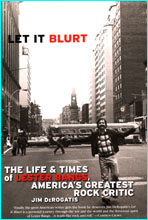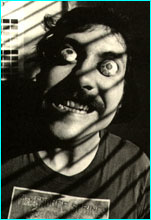Papermag.com
|
Published:
WEDNESDAY, APRIL 19, 2000
Lester Bangs Was A Real Yahoo
The first thing to understand and bear in mind at all
times is that the whole thing is just a big ruse from the word
go, it don't mean shit except exploitatively and in the zealotic
terms of wanting to inflict your tastes on other people. . .
Rock 'n roll's basically a bunch of garbage in the first place,
it's noise, it's here today and gone tomorrow, so the only thing
that can possibly trip you up is if you begin to reflect that if
the music's that trivial, can you imagine how trivial what
you're doing is? "She's Lost Control" isn't just a Joy Division
song. As anyone who's been watching VH-1 lately can tell you,
losing control is the national anthem of the rock nation.
Self-implosion's a theme so pop-played that MTV's sister station
can reduce it into easily digestible, formulaic chunks. With
minor variations on the theme, it doesn't really matter who Behind
The Music or Legends is about. The equation's simple:
Phil Lynott's heroin-scabbed feet equals Iggy Pop's bleeding
chest equals the time Dr. Dre beat up the television host equals
how Hillel Slovak quit the Red Hot Chili Peppers equals Altamont
equals Woodstock '99. . . and so on. Not that these events
aren't tragic, or comic, or some combination of the two. It's
just that tragedy's such a hot, saleable commodity -- all that
blood, sweat, tears, piss and pain -- and that's why it's pop
culture's gold standard. It's not good unless your parents hate
it and, like the Times Square arcade marquee reads, Too Much Is
Not Enough. That's the lesson of youth, and our greatest rock 'n
roll stars studied hard. In Let it Blurt: The Life and Times
of Lester Bangs, America's Greatest Rock Critic, Jim
DeRogatis shows that Lester Bangs helped write the lesson plan.
A long-time contributor to Rolling Stone, The
Village Voice and editor of Creem, Bangs defined the
rock 'n roll lifestyle as both critic and addict. Years of
trading insults with Lou Reed and writing scathing,
thousand-word reviews in less time than it takes to get high
earmarked his career, but his influence and myth are legendary
-- and with good reason. DeRogatis portrays Bangs as the
self-styled Beat madman of rock criticism, equal parts Kerouac,
Burroughs and Bozo the Clown competing in both his writing and
his life, his opinions accurate to a fault, his relationships
with women and editors in almost constant crisis. It's a sad
story, made all the more tragic for its familiarity.
DeRogatis' Bangs was a large, smelly man who reminded
acquaintances of Rob Reiner (Meathead from television's All
In The Family), a comparison the critic hated. Often unable
to separate his personal life from his work on paper, Bangs had
a needling habit of destroying friendships with his negative
reviews. After championing Patti Smith's first album, Bangs
viciously dogged her second; their friendship never really rose
above it. Similar ego clashes with The Dictators, Blondie,
Richard Hell, Lou Reed and The Clash litter Let It Blurt's
pages, but DeRogatis wisely contrasts Bangs' critical vision
with the blindness of his personal life. Girlfriends, many of
them famous in their own right now, describe Bangs as honest to
a fault, saddled with an enormous emotional immaturity.
DeRogatis' research agrees: The critic couldn't just date, he
had to be in love, and he couldn't just be in love, it had to be
the greatest love of all time. With his drug, alcohol, cough
syrup and Jehovah's Witness problems, befriending Bangs was not
unlike having a pile of bleeding ground beef lying around the
middle of your living room floor. The odor, it seems, eventually
got to everyone -- including his editors at The Village Voice,
who published an article about Bangs in 1982 entitled
"Yecch! An Interview with a Slob." "One day not
long ago, a bum/derelict wandered into our offices," the
article begins. "I was on the verge of calling 911 when
someone greeted this monstrosity with 'Lester Bangs -- glad to
see you!'"
It's not exactly a sympathetic portrait. But if DeRogatis
meticulously documents Bangs' shortcomings, he also uses the
critic's faults to highlight accomplishments. Bangs' nervy,
balls-to-the-wall writing style (often aided by crystal meth)
rose to the challenge of describing pop ephemera with critical
intelligence. Like Hunter S. Thompson, Bangs' wrote from
empirical evidence -- whatever evidence his binges left him --
with an unnerving foresight and desperate sense of humor. At one
point, DeRogatis tosses off a quote from one of Bangs' editors
about how the critic was dissatisfied with New York City; how
the "scene" (CBGB, mainly, of which Bangs was a messy
mainstay) was too insular and pretentious to produce music of
any lasting value. Instead, the editor says that Bangs saw
rock's future in small-town America, areas detached from the
grind of publicity wheels. A full decade before Nirvana released
Nevermind, Bangs cited the Pacific Northwest as a
hot-spot. And not surprisingly, pop music's resident oracle
carried punk's torch in the days when The Stooges and The MC5
were still in after-school detention.
If nothing else, DeRogatis shows how Bangs, along with a
handful of other writers, is responsible for creating rock 'n
roll's myth. It's not pretty and doesn't flow as easily as one
of VH-1's documentaries, but Let It Blurt is far more
valuable than the mere details of a single story: It illustrates
the whole damn thing being made.
JONATHAN DURBIN
|

